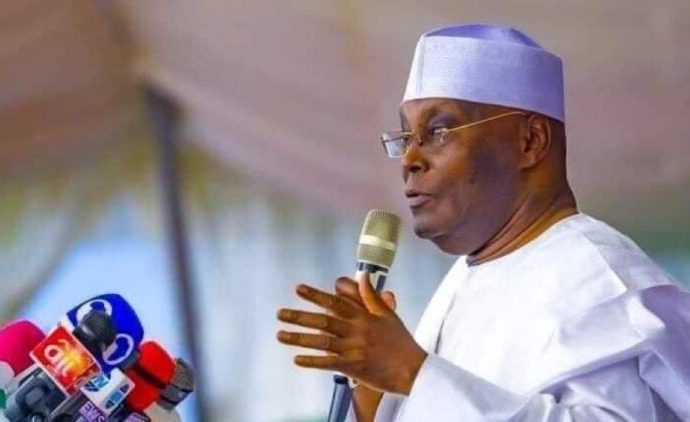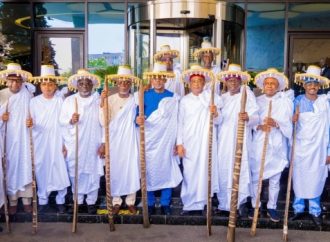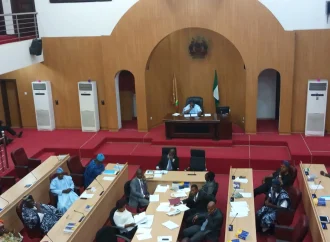Atiku Abubakar Blames Nigeria’s Security Crisis on Weak Political Will Former Vice President of Nigeria, Atiku Abubakar, has stirred fresh debate on the country’s ongoing security challenges, declaring that the Boko Haram insurgency could have been contained if subsequent governments had demonstrated the same level of political will that existed during his tenure with former
Atiku Abubakar Blames Nigeria’s Security Crisis on Weak Political Will

Former Vice President of Nigeria, Atiku Abubakar, has stirred fresh debate on the country’s ongoing security challenges, declaring that the Boko Haram insurgency could have been contained if subsequent governments had demonstrated the same level of political will that existed during his tenure with former President Olusegun Obasanjo.
Speaking during a meeting with stakeholders from the Kogi East Senatorial District in Abuja on Wednesday, Atiku recalled how swift and decisive leadership quashed the group’s early threat in 2002. The delegation was led by Simon Achuba, a former Deputy Governor of Kogi State. The visit provided Atiku a platform to reflect on the roots of the Boko Haram crisis and to critique Nigeria’s current and past leadership for their failure to act resolutely.
Atiku Abubakar Blames Nigeria’s Security Crisis On Past President Boko Haram menace
“How Obasanjo Crushed Boko Haram in 2002”
According to Atiku, the insurgent group first emerged in Yobe State in 2002, a period when he was Vice President under the Obasanjo administration. Atiku narrated that upon receiving intelligence about the group’s activities, President Obasanjo consulted him directly on what course of action to take.
In a video posted to his official Facebook page, Atiku described their urgent response: “The president sent for me. ‘VP, what do we do about this?’ And I said, ‘Mr President, let’s call the Service Chiefs and give them a deadline. If they can’t put it down, then they should put down their uniform and go away.’”
Atiku said the military leadership was summoned and issued strict marching orders. “Within a few weeks,” he continued, “they put down the insurgency in Yobe. It never came up again until we left office.”
This anecdote underscores his belief that Nigeria’s earlier leaders had both the clarity and resolve needed to combat security threats effectively. He contrasted this with what he described as an alarming lack of commitment from the country’s current leadership.
“Leaders Must Prioritize Lives Over Politics”
Atiku did not hold back in assigning blame for Nigeria’s deteriorating security landscape. He squarely faulted political leaders who, in his view, have failed to treat the loss of lives with the urgency and empathy it demands.
“When they’re killing your citizens, how can you even eat? They’re killing your citizens and you don’t give a damn,” he said. “That is the greatest irresponsibility by any political leader, anywhere.”
The former Vice President warned that the lack of political will is one of the root causes of Nigeria’s enduring insecurity—from insurgency in the North-East to rising banditry and kidnapping in other parts of the country. He asserted that without decisive leadership, no amount of military spending or security reforms will yield results.
His message was clear: the current situation in Nigeria is not just a product of poor military strategies but also a reflection of political negligence at the highest levels.
“A Call for Political Accountability in Security Matters”
Atiku’s comments come at a time when public trust in government handling of national security is dwindling. With frequent reports of mass abductions, rural attacks, and mounting military casualties, citizens are increasingly demanding greater accountability from their leaders.
As a veteran politician and former Vice President, Atiku’s words carry significant weight. His criticism is a call for leaders to stop treating security as an abstract issue or a campaign talking point, and to begin addressing it with the seriousness and urgency it requires.
He reiterated that true leadership must go beyond rhetoric. “It’s about saving lives, restoring peace, and showing that the state still has authority,” he said.
“Revisiting Lessons from the Past”
Atiku and Obasanjo’s administration (1999–2007) is often remembered for restoring civilian rule in Nigeria after decades of military dictatorship. That period, according to Atiku, also set a precedent for how to decisively confront emerging threats.
His reminder of the 2002 crackdown on Boko Haram serves both as a historical insight and a pointed challenge to current leaders: that effective governance is not about delay or denial but about acting when it matters most.
Though Boko Haram later re-emerged and grew into a full-blown insurgency after 2009, Atiku insists that the government’s initial success proves the threat was not insurmountable.
In his closing remarks to the Kogi delegation, Atiku reaffirmed his belief that Nigeria’s security crisis can be resolved—but only if its leaders summon the courage to act.


















Leave a Comment
Your email address will not be published. Required fields are marked with *